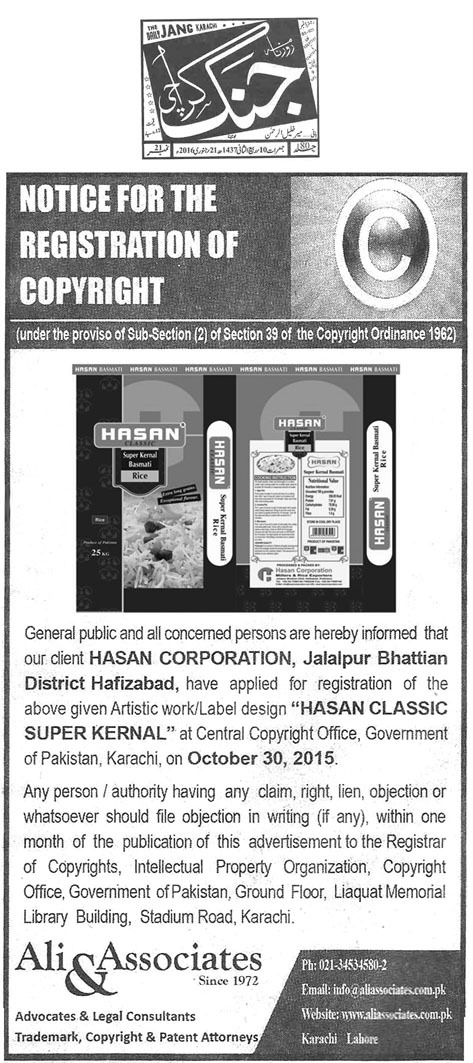Photo

ALI & ASSOCIATES TRIUMPHS AT THE ASIA IP AWARDS 2017
#Ali & Associates#Karimullah Adeni#IP Law Firm of the Year#Pakistan#Law#Lawyer#intellectual property#trademark#copyright
0 notes
Link
#SaudiArabia #fake #accounts #block #Intellectual #Property #Trademark #Law
0 notes
Link
#Famous #fashion #brand #LouisVuitton #loses #trademark #lawsuit.
0 notes
Photo
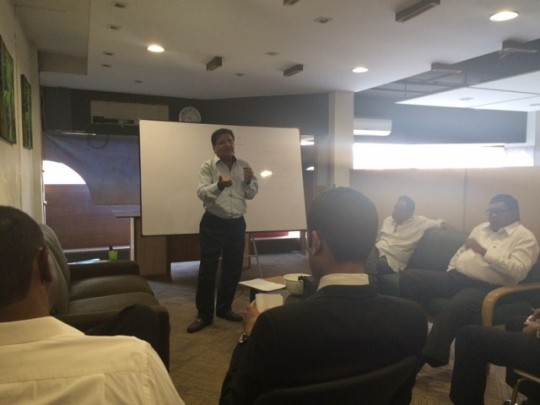


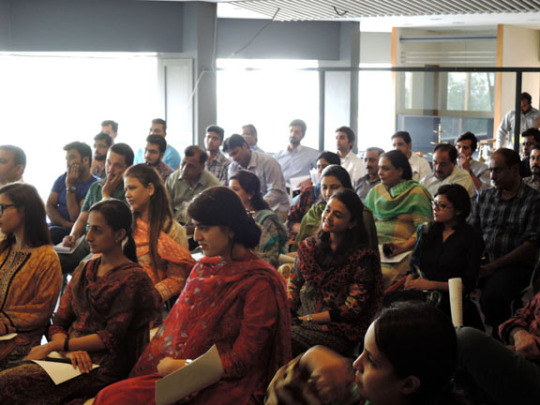
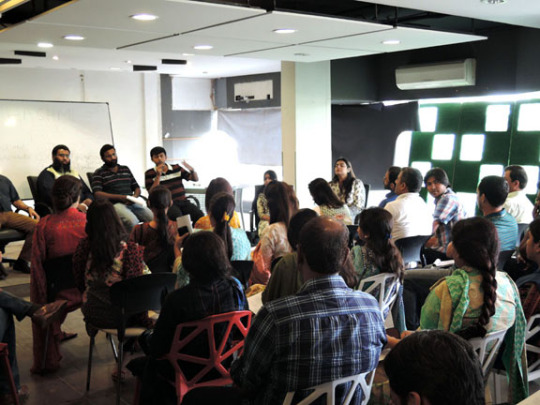
#Training and #Discussion session by Mr. Idreesh Sheikh, senior consultant; on Drug Regulatory Authority Pakistan #DRAP
0 notes
Photo
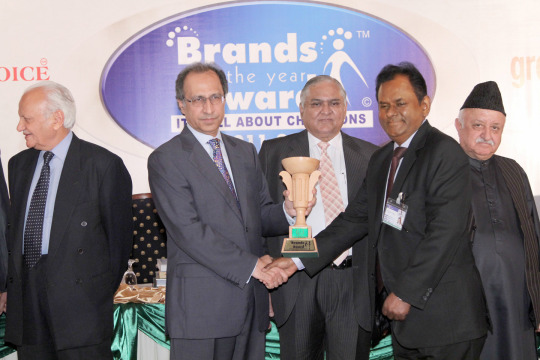
Mr. Karimullah Adeni, Managing Partner, Ali & Associates, receiving "Brand of the Year" award from the Finance Minister of Pakistan, Dr. Abdul Hafeez Shaikh.
0 notes
Link
0 notes
Link
Demanding that Plant Breeders’ Rights Bill 2010 should not be passed in haste as it needed more time to be debated by the stakeholders concerned
0 notes
Link
0 notes
Text
Global Trade in Fake Drugs Tops $30 Billion
The World Health Organization estimates that 25 percent of medicines sold in poor countries are counterfeit. Monitoring by the World Bank and others suggests the overall global trade in fake and substandard drugs is now more than $30 billion per year. Experts are asking for stricter regulation and better international collaboration to check this public health menace.
Some 40 percent of the drugs available in many sub-Saharan African and South American countries are either fake or substandard - according to research by the World Bank and international public health groups. And experts say the widespread circulation of poor-quality or substandard medicines leads to frequent treatment failure and even loss of life.
Experts working to stop this counterfeit drug traffic met in Washington recently to discuss legal and enforcement solutions. Louise Shelley is a criminologist and director of the Terrorism, Transnational Crime and Corruption Center at George Mason University in Virginia.
“We are focusing much more on narcotics trafficking rather than on counterfeits that can do harm to many more individuals than consuming of illicit drugs," said Shelley.
Shelley says sophisticated transnational criminal organizations are behind the manufacture and distribution of drugs that do not conform to proper standards. She says only a coordinated international effort can deal with organized crime on this scale.
“I think WHO, law enforcement community, consumer organizations, civil society everybody has a role in it," she said.
“You have no guarantee of the safety, efficacy or quality of those products," said Margaret Hamburg.
Dr. Margaret Hamburg heads the Food and Drug Administration, the federal agency which oversees the safety of drugs and food products in the United States. The FDA took strong action this week against thousands of internet pharmacies selling illegal medical products.
Dr. Patrick Lukulay of The United States Pharmacopeia, an organization that sets standards for medicines, says drug purity needs to be ensured through an international initiative, because the ingredients come from many parts of the world.
“In the US - 80 percent of active ingredients come from either India or China into the US so US companies are vulnerable," said Lukulay.
“In India you have 10,000 manufacturing companies and so although the regulators are making investments it’s difficult to catch up," said Andreas Seiter.
Andreas Seiter is a global pharmaceutical expert. He says many countries need to increase their regulatory capabilities.
And Michael Bates of the World Health Organization says it is not only patients who are ignorant about fake medicines. He says many health professionals are also unaware.
“This is a complex international trade. And we need greater information on the scale and the scope, the harm and economic damage done by this issue to convince the policy makers to commit resources to tackle this," said Bates.
Experts say a worldwide, coordinated effort is needed to deal with the problem - including better monitoring and regulation, upgrades in law enforcement capabilities, and the sharing of testing technology.
0 notes
Text
Facebook confirms it shut down The Cool Hunter’s Facebook Page over copyright infringement
Two months ago, Facebook shut down The Cool Hunter‘s Facebook Page. Founder Bill Tikos this week posted about what happened (a submission for which hit theHacker News frontpage), and was clearly frustrated as the decision was a huge blow to his business. Facebook has confirmed with me today that the reason for the removal of the Page was multiple instances of copyright infringement.
Tikos said that five years’ worth of content and the Page’s 788,000 fans have been lost. The number of Likes on the Page increased between 1,500 and 2,500 daily, and the Page generated more than 10,000 clicks to the site TheCoolHunter.net every day.
The link for the page, facebook.com/thecoolhunter, now simply displays “The page you requested was not found.” Tikos was understandably pissed as he didn’t know why it had happened:
No explanation, flimsy warnings, no instructions on what to do next. None of our numerous attempts to rectify the situation and resurrect the page have worked.
And because we suspect there are other businesses in the same bind, we are writing this to seek help and encourage open conversation. This is not a minor problem. This is a huge issue and potentially fatal to businesses. We feel that FB must change its one-sided, secret policies and deal with us, and others like us, openly and fairly.
Tikos then detailed how important the Facebook Page was to his business and wondered out loud what he had done wrong. Although he managed to get it back briefly, Facebook promptly took it down again. The first time around, Facebook responded with this reason for the removal of the Page: “This user was disabled for repeat IP infringement.”
I contacted Facebook to verify this. I was told Tikos had received multiple warnings. Here’s the statement I got back:
This account has been disabled due to repeat copyright infringement under our terms and the account has been removed from the site accordingly. Additionally, we have thoroughly reviewed all related reports and have determined that we took the correct action in this case.
That last part is critical. I pressed Facebook to make sure that the cases weren’t just automatically flagged by some filter or too many reports from users. The spokesperson confirmed with me that all the claims of copyright infringement were legitimate.
So, what exactly did Tikos do wrong?
We know of only two infringements – two situations where FB closed our account, and we argue strongly that they were not infringements at all. The problem with this is that you don’t know if what you are posting could irk FB. But even if FB disagrees with the images we posted, are two images enough to kill our account with no chance of recourse?
Well, yes, it’s enough. In fact, Tikos wrote two conflicting statements in his post: “The other reason that could have caused the closure of our FB page is that we sometimes use images even when we do not know who has taken the picture.” and “We have never intentionally broken any FB rules and we are willing to do whatever it takes to get our page back.”
In Facebook’s terms of service ( Statement of Rights and Responsibilities), under the “Protecting Other People’s Rights” section, the first rule is: “You will not post content or take any action on Facebook that infringes or violates someone else’s rights or otherwise violates the law.” Furthermore, in its Community Standards, under Intellectual Property, Facebook states: “Before sharing content on Facebook, please be sure you have the right to do so. We ask that you respect copyrights, trademarks, and other legal rights.”
After all this, will Facebook give Tikos another chance? “No,” a Facebook spokesperson told The Next Web in a statement. “This is permanent removal.”
Image credit: Anna Maria Lopez
1 note
·
View note
Text
Delhi High Court Clears Confusion On Parallel Imports
CRN Network, October 5, 2012, 1530 hrs
The Delhi High Court has cleared the confusion around parallel imports. In a landmark judgment, a Division Bench of the Delhi High Court has ruled that parallel import is authorized under Indian trademark laws and does not infringe the trademark of the rights-holder.
In a lawsuit between Samsung Electronics and Champion Computers, Delhi-based IT hardware and peripherals distribution house, the bench of Justices Pradeep Nandrajog and Siddharth Mridul overruled the findings of a single judge who had in February 2012 held that trademarked goods should be imported to India only through authorized distributors of the trademark-holder or with his permission.
The Division Bench observed that the learned single judge had followed an erroneous approach to conclude that import of goods into India needed the consent of the registered trade mark owner.
The court recognized the principle of international exhaustion under the Trade Marks Act, 1999, and held that the expression in any geographical area, in the Act “clearly envisages that the legislative intent was to recognize the principle of international exhaustion of rights to control further sale of goods once they were put on the market by the registered proprietor of the trade mark.”
Overruling Samsung’s stand that national exhaustion was in the country’s best interest, the judges said that India does not follow the policy of national exhaustion in its trademark statute. “This is a matter of policy, and it is for the legislature to take a call. We must note that the adoption of the principle of national exhaustion may not necessarily encourage industry to be set up in that country. Dual pricing may cause injury to the consumer…”
The court inserted two conditions upon the appellants: They will not metatag or hyperlink their Websites with Samsung’s site; and they will carry prominent signage in their store to indicate that the product sold by them has been imported and that Samsung does not provide any warranty or after-sales services for those goods.
The suit was initially filed by Samsung Electronics and its Indian subsidiary Samsung India last year, under which it was claimed that Champion Computers was unauthorizedly selling Samsung printers imported directly from foreign markets. The Single Judge had held Champion Computers guilty of trademark violation. In an immediate cascading effect in the market, Dell had filed suits against parallel importers, issued nation-wide alerts and attempted to stop imports.
For Kapil Wadhwa, Founder-Director, Champion Computers, it was as much a moral battle as it was commercial. “The printers were being imported by us in due regard to all laws and policies, in the spirit of open and free trade. We are happy the Delhi High Court has upheld our point of view and cleared the confusion and fear spread in the market by MNCs which were using trademark law as a tool to thwart competition and protect their own pricing and profit margins.”
He added, “By comparing legitimate goods directly imported into the country with counterfeit and fake goods, brand owners have created immense confusion in the minds of consumers. This judgement will be a great boon to Indian consumers who will derive the benefit of competitive pricing.”
The All Delhi Computer Traders’ Association (ADCTA), which backed Champion Computers throughout the case, has welcomed the ruling. “This is a landmark judgement as it lends legitimacy to the whole concept of parallel imports. Several parallel importers incurred financial loss, damage to reputation and mental agony due to restrictive trade practices of Samsung India and Dell India,” said Mahinder Aggarwal, President, ADCTA.
0 notes
Text
Pfizer says to appeal over India drug patent refusal
US drug giant Pfizer said Friday it will appeal against an Indian ruling overturning a patent for a cancer drug, saying the decision raises questions about intellectual property protection in India.
Indian generics heavyweight Cipla opposed the granting of the domestic patent for Prizer's Sutent, which is used to combat liver and kidney cancer.
The patent office's decision went to the heart of India's patent act, which says a patent cannot be granted for a drug unless changes make it significantly more effective and innovative.
"The patentee (Pfizer) has miserably failed to demonstrate any improved activity" warranting a patent, the patent office said in its decision.
"The invention that is claimed in the patent does not involve any inventive step... and hence (is) not patentable," Nilanjana Mukherjee, senior patent officer, said.
A spokesman for Cipla, which revolutionized AIDS treatment by supplying cut-price drugs to the world's poor and which has been campaigning to be able offer other low-cost generic medicines, had no immediate comment.
But Pfizer managing director Jazz Tobaccowalla said the company believes the ruling "undermines intellectual property rights in India".
"We will vigorously defend our basic Sutent patent," the Pfizer executive said in a statement, adding the company would appeal against the ruling to India's Intellectual Property Appellate Board.
The patent decision marked another win by Cipla against a global pharmaceutical company.
In September, a court threw out a patent infringement case launched against Cipla by Swiss drug maker F. Hoffmann-La Roche over the Mumbai firm's version of a lung-cancer drug, ruling it had a different molecular makeup.
The cases have been watched worldwide as they involve interpretation of stricter drug patent protection rules introduced by India in 2005 to comply with World Trade Organization regulations.
India has some of the toughest criteria for drug companies to obtain patents, said D.G. Shah, secretary general of the Indian Pharmaceutical Alliance, an industry body.
"These rulings show (foreign) companies need to take into account that India will not permit tweaking of formulations for getting a patent. If they had those expectations, they were unrealistic," Shah told AFP.
Medical charities have expressed concern compliance with WTO rules could reduce the country's role as a supplier of low-cost medicines. India is the world's leading exporter and manufacturer of non-branded medicines.
But Western firms -- looking to countries such as India for sales growth -- have voiced criticism of brand protection in India.
Earlier this year, an Indian ruling allowed a local firm to produce a vastly cheaper copy of German pharmaceutical giant Bayer's patented drug Nexavar for liver and kidney cancer.
India's patents chief ruled the price Bayer charged was "exorbitant" and told the firm to give a "compulsory license" -- permitted under WTO rules for public health reasons -- to Indian firm Natco Pharma to make a less costly version.
Experts say that ruling could pave the way for a rush of other "compulsory license" applications in India and other poor nations, allowing access to patented life-saving drugs at a fraction of the cost.
0 notes
Text
Fake prescription pills worth $1 million seized
Police say they've seized thousands of fake prescription pills worth more than $1 million as part of an international operation targeting criminal groups.
RCMP Sgt. Duncan Pound says the operation, which ran from Sept. 25 to Oct. 2, was co-ordinated by Interpol and spanned 100 countries.
He says the fake medications sent by mail included anti-depressants, sedatives, prescription weight-loss products, heart medications, hormone-replacement therapies and erectile-dysfunction drugs.
Police say a 58-year-old B.C. man was caught with 6,000 counterfeit erectile-dysfunction medications and they've recommended charges to Crown counsel.
.
0 notes
Text
The Domain Name That Refuses to Die
If you have fond (well, perhaps, any) memories of the original dot-com boom (and bust), circa 1997-2001, you might enjoy this UDRP case: a decision involving the domain name <kozmo.com>.
Created on April 2, 1997, the <kozmo.com> domain name was used by a company called Kozmo.com, Inc., in connection with free online ordering and one-hour delivery of such products as “videos, games, dvds, music, mags, books, food, basics & more.” The company filed for a $150 million initial public offering in March 2000. Thirteen months later, it went out of business — in what Businessweek at the time described (in an article titled “What Led to Kozmo’s Final Delivery“) as a “path from stardom to the dot-com dustbin [that] is symbolic of the end of the Internet boom.”
Eleven years later, a UDRP dispute over <kozmo.com> shows that “the history of the Disputed Domain Name remains unclear,” as the UDRP panelist wrote.
The UDRP complaint was filed by Yummy Foods, LLC, of Los Angeles (the “Complainant”), which owns two federal trademark registrations in the United States for the mark KOZMO for use in connection with retail store and delivery services. For obvious reasons, Yummy Foods wanted to acquire the <kozmo.com> domain name, but apparently the domain name remained registered to Kozmo.com, Inc. (the “Respondent”), even though that company no longer existed. And, curiously, according to the UDRP decision, renewal of the domain name was “in arrears 7 years.” (My review of the current Whois record shows that the domain name was set to expire on April 3, 2011.)
Despite the oddities of this case, the panelist wrote that the UDRP “was not designed as a tool for obtaining domain names from defunct corporations.” And, the panelist refused to transfer the domain name to Yummy Foods, due to a lack of the essential “bad faith” element required in every successful UDRP proceeding:
Respondent could not have known of Complainant’s mark when it registered the Disputed Domain Name. In fact, as Complainant has repeatedly emphasized, Respondent ceased to exist almost ten years before Complainant began operations under the KOZMO mark. Furthermore, during its time in operation Respondent had a United States trademark for the Disputed Domain Name and offered bona fide goods and services through the Disputed Domain Name. Accordingly, Respondent did not register the Disputed Domain Name in bad faith. Lastly, the Disputed Domain Name has been in locked status without reverting to any active website since 2005. These facts demonstrate that Respondent’s conduct does not qualify as bad faith under paragraph 4(b) of the Policy.
While this decision is solid, it leaves a number of questions unanswered, such as:
Should domain name registrars be permitted to maintain registrations of domain names registered to defunct (or non-existent) entities, especially when they are made aware of this status? (Of course, domain name registrations using fictitious names have been a common cybersquatting problem for years; I have personally filed UDRP complaints against registrants identified as “Barack Hussein Obama Jr” and “Sdf fdgg.”)
What can (or should) a “dying” entity do with its domain names, especially if they might have independent value?
Who, if anyone, has the right to control a domain name previously used by a now-defunct corporation?
Why would a domain name registrar maintain a domain name if its renewal was in arrears seven years, and should this even be allowed?
2 notes
·
View notes
